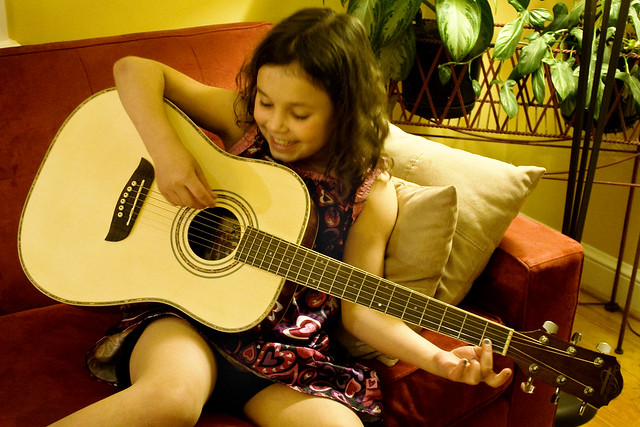
Ok. So you’ve found the perfect music lessons.
Now let’s talk about practicing.
I’m a guitar player.
I’m a guitar teacher.
I’m a guitar student.
And I have wasted a ton of time practicing…
It goes like this:
- Student goes to lesson.
- Instructor teaches student a new song (or chord, or scale, or whatever).
- Instructor tells student to practice every day for 30 minutes.
- Student goes home.
- One week passes.
- Student practices for 5 minutes before the lesson.
- Instructor is frustrated.
- Student is embarrassed.
- Parent is out another $75 for that lesson.
The bad news… this routine is all too common.
The good news… there is an easy fix. Here’s how…
ENTER: Deliberate Practice
You’re busy. Your child is busy. We’re all really busy. I get it. It’s okay. You can still learn to play music (or anything for that matter) without spending every single second of your (limited) free time practicing.
I’m a strong proponent of deliberate practice. This is how elite musicians become elite musicians. But it’s also how beginners (or anyone) can learn more quickly – without spending a lot of time. Essentially it boils down to practicing the right material. I’m big on efficiency.
Deliberate practice is easy in principle, but hard in real life. But totally worth it.
The idea is simple:
Spend a short and focused amount of time, practicing the areas that need the most improvement.
Take the piano for instance:
Rather than practice the C Major scale, which you know backwards and forwards and could play in your sleep, practice where you’re weak.
B-Flat Major was always hard for me.
So start slow and deliberate. Is there a particular part of the B-Flat scale that you struggle with? Ok – focus on that part. Over and over and over.
Running over your scales casually for 30 minutes each day will do you no good. But students do it because it’s easy. It also makes it feel like you’ve spent time practicing on getting better, when really you’re just barely maintaining what you already know. This will not lead to improvement.
Deliberate practice is focused and takes effort. But the results are astounding.
How do you sound?
Do you even know how you sound?
You should. Otherwise, how can you figure out what/where to improve?
I record my practice session (and encourage my students to do the same). Why? Because it helps students objectively focus on areas that need improvement. It also acts as an easy measurement for progress (it’s the same reason why people trying to lose weight take photos of their weight loss progress). It can be eye opening, and little difficult to swallow at first – but it can put you on a speedy path to progress.
How to get started…
First, talk to your child’s teacher. See if you’re on the same page. If not…find a teacher who understands your time allotment each week.
Next, start working on the stuff that’s giving you trouble. Start slow. Break it out into little pieces. Ideally, you should try to allot time each week to work and practice. But that’s not always possible.
For my guitar students, I’ll recommend that they keep the guitar by the couch. Whenever a commercial break comes on, I have them turn down the volume and practice the little parts that give them the most trouble. The time adds up, and improvement comes more quickly.
Overall, embrace discomfort. Practice hard – but practice smart. Then go out and play.
Note: I talk about practice A LOT on this site. If you’re interested in learning more about deliberate practice, check out Study Hacks.
(Photo Credits: woodleywonderworks)
3 replies on “HOW TO PRACTICE GUITAR (For only a few MINUTES each day…and still be pretty good)”
[…] I’ve written a lot about how to practice. Usually it’s focused on the guitar… but it doesn’t really matter what instrument… the methods are the same. […]
[…] Best Way to Practice the Guitar […]
[…] Now, there are other factors at play here, such as the quality of your practice (which I’ve written about here). […]